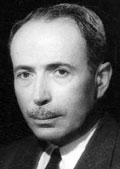 |
Antoine Pinay
b. 30 Dec 1891, Saint-Symphorien-sur-Coise, Rhône
d. 13 Dec 1994, Saint-Chamond, Loire |
| Title: |
Président du Conseil des ministres (President of the Council of Ministers) |
| Term: |
8 Mar 1952 - 8 Jan 1953 |
| Chronology: |
6 Mar 1952,
endorsed by the vote of investiture, session of the Assemblée nationale (National Assembly), Palais-Bourbon, Paris [1] |
|
8 Mar 1952,
appointed, decree of the President of the Republic [2] |
|
8 Jan 1953,
ceased to exercise the functions of office upon the appointment of a successor [3] |
| Biography: |
| Originated from the family of hat-makers; attended the Marist Fathers' school at Saint-Chamond, Loire; served as artillery officer during World War I, was wounded and awarded; married a daughter of the owner of the Fouletier tannery (1917); took part in the family business helping to modernise the tannery; was elected to the municipal council of Saint-Chamond (1929); mayor of Saint-Chamond (1929-1977); named councilor general of the département of Loire (1934-1936); president of the commission of the département of Loire (1934-1936); proved himself an able administrator and financier; was elected to the Chambre des députés (Chamber of Deputies), representing Loire (1936-1938); won election and took a seat in the Sénat (1938-1940); sat with the Democratic and Radical Union (Union démocratique et radicale); voted to cede all constitutional power to Philippe Pétain (10 Jul 1940); supported the Vichy government and was appointed to the National Council (1941), but did not take seat, retaining the office of mayor of Saint-Chamond; after the liberation of France, he was placed under surveillance and did not participate in the municipal elections of 1945; was elected again to the general council of Loire in 1945; his electoin was invalidated on the ground of his voting for Pétain, but later this decision was repealed because his actions as mayor were considered resistance to the occupation; joined the Republican Party of Liberty (Parti républicain de la liberté); elected to the second (1946) Assemblée nationale constituante (Constituent National Assembly) and to the Assemblée nationale (National Assembly), representing Loire (1946-1958); president of the general council of Loire (1949-1979); contributed to creation of the National Centre of Independents (Centre national des indépendants, CNI); served as secretary of state for economic affairs (11 Sep 1948 - 28 Oct 1949) in the Cabinet of Henri Queuille; minister of public works, transport, and tourism (12 Jul 1950 - 8 Mar 1952); formed the first government of the right centre; President of the Council of Ministers (8 Mar 1952 - 8 Jan 1953) and minister of finance and economic affairs (8 Mar 1952 - 8 Jan 1953); won public support by following popular pledge to impose no new taxes and decreasing electricity rates; minister for foreign affairs (23 Feb 1955 - 1 Feb 1956); minister of finance (1 Jun 1958 - 8 Jan 1959), minister of finance and economic affairs (8 Jan 1959 - 13 Jan 1960); honorary president of the CNI (1962-1973); served as first French ombudsman (médiateur) (30 Jan 1973 - 21 Jun 1974). |
| Biographical sources: Dictionnaire des parlementaires français 1889-1940, 7:2703. |
| Elections: |
| Vote of investiture (6 Mar 1952) |
| votes cast |
530 |
| constitutional majority |
313 |
| in favour |
324 |
| against |
206 |
|
| Source of electoral results: Journal officiel de la République française. Débats parlementaires. Compte rendu in extenso des séances de l'Assemblée nationale et du Conseil de la République. N° 25. Vendredi 7 Mars 1952. P. 1216-1217. |
| |
| [1] |
Journal officiel de la République française. Débats parlementaires. Compte rendu in extenso des séances de l'Assemblée nationale et du Conseil de la République. N° 25. Vendredi 7 Mars 1952. P. 1180-1195. |
| [2] |
Journal officiel de la République française. Lois et Décrets. N° 60. Samedi 8 Mars 1952. P. 2756. |
| [3] |
Journal officiel de la République française. Lois et Décrets. N° 7. Jeudi 8 Janvier 1953. P. 307. |

